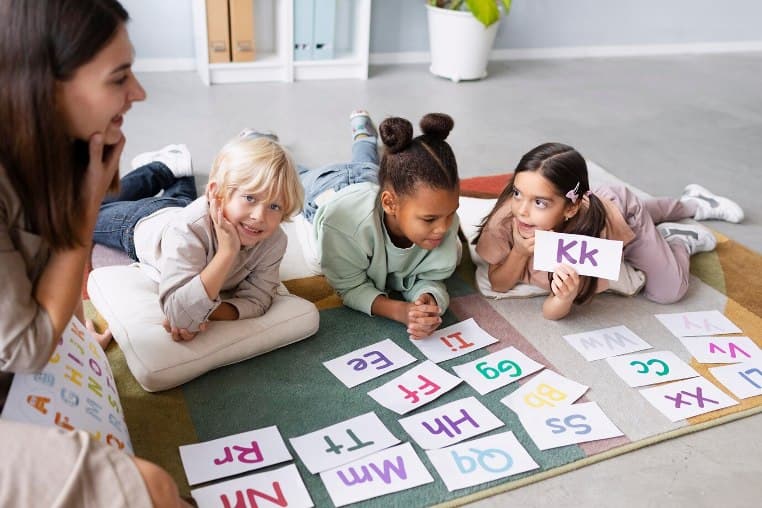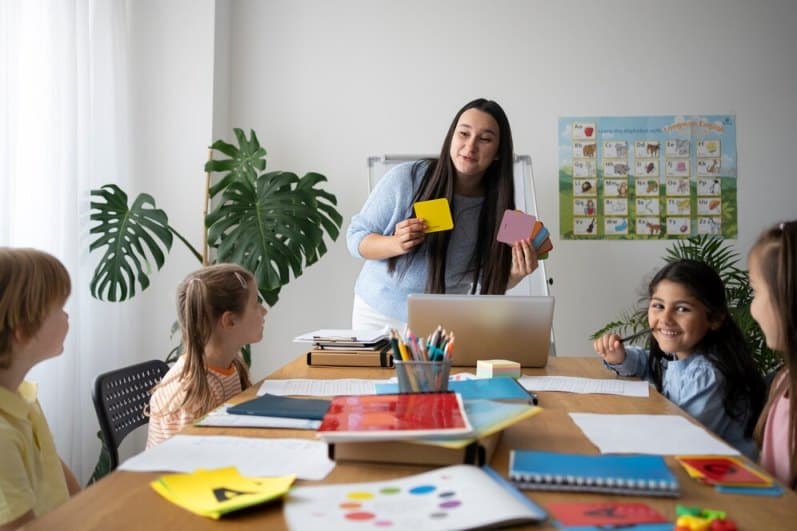Mastering the skill of asking questions in class can make a significant impact on a student’s learning journey. Effective questions go beyond merely filling gaps in knowledge; they foster active engagement, clarify complex concepts, and encourage collaborative learning among peers.
By learning how to ask well-crafted questions, students empower themselves to explore topics in-depth, overcome challenges, and gain confidence.
Below, we look at the best ways to ask questions in class, as well as ideas for improving confidence and question-asking techniques.
Importance of Asking Questions in Class
The learning process is guided by questions. When students actively seek clarification, it shows they’re engaged, encourages deeper thinking, and can help peers gain insights they might have missed.
Here are the top benefits of asking questions in a classroom setting:
- Clarifies Concepts: Questions help clarify confusing information, ensuring that students fully understand the topic at hand.
- Engages the Class: Asking questions can create a collaborative learning environment where all students feel more involved.
- Encourages Critical Thinking: Questions promote a more profound analysis, pushing students to explore topics in-depth rather than accepting information at face value.
Read Also: How to Get More Students Involved in Extracurricular Activities?
Identifying the Right Moment to Ask Questions
Timing can significantly impact the effectiveness of a question. Asking at the right moment ensures minimal interruption and maximizes clarity. Below are tips to identify optimal times:
- During Pauses: Instructors often pause at natural breaks. Use these moments to ask questions relevant to the section just discussed.
- After Key Points: When a teacher emphasizes an important concept, it’s an ideal opportunity to ask clarifying questions if any confusion remains.
- At the End of Class or Section: If it’s a general or summary question, waiting until the end of a class segment may benefit both you and your classmates by minimizing interruptions.
Framing Questions for Maximum Clarity
Effective questions are clear and direct, making it easier for teachers to respond meaningfully. Here are some key techniques:
- Be Specific: Avoid vague questions. Instead of “I don’t get it,” try, “Could you clarify the difference between X and Y?”
- Stay On Topic: Make sure your question relates to the current discussion. Off-topic questions can be distracting and may be better saved for one-on-one conversations with the teacher.
- Use Examples: If you’re unsure about a concept, using a specific example can help clarify your question. For instance, “In this equation, if we change X to Y, how would that affect the outcome?”
Boosting Confidence When Asking Questions
Building the confidence to ask questions can be challenging for many students. Feeling intimidated is common, but with practice, students can become more comfortable. Here’s how:
- Prepare in Advance: Review material before class. Having background knowledge makes it easier to formulate relevant questions.
- Practice Self-Encouragement: Remind yourself that questions are a vital part of learning. Often, other classmates share the same question.
- Start Small: Begin by asking simple questions to build confidence. Gradually progress to more complex or critical questions as you become more comfortable.
Strategies for Asking Questions That Deepen Understanding
Some questions go beyond the basics and encourage critical analysis. Here are strategies for developing more thought-provoking questions:
- Use “How” and “Why”: Questions that start with “how” and “why” encourage analysis. For example, “Why does this process work this way?” can deepen understanding beyond factual details.
- Ask About Relationships Between Concepts: Instead of asking about a single fact, inquire about how different ideas connect. For example, “How does concept A relate to concept B?” helps in understanding the bigger picture.
- Challenge Assumptions: In some classes, such as literature or history, it can be beneficial to question underlying assumptions. For instance, “What might happen if X assumption were different?” stimulates analytical thinking.
Polite Questioning Techniques to Respect Classroom Dynamics
Being respectful in how questions are posed is essential to maintaining a positive classroom atmosphere. Here are ways to ask questions politely:
- Raise Your Hand: Follow the class’s protocol for signaling questions, whether by raising your hand or waiting for a break.
- Phrase Questions Respectfully: Use polite language, such as “Could you explain…?” or “I would like to understand…” rather than “You didn’t explain…”.
- Limit Interruptions: Avoid interrupting the teacher or classmates. If the instructor is in the middle of an explanation, note your question and wait for a suitable moment.
Check More: What to Do When Your Teacher Hates You for No Reason
Alternatives to Asking Questions During Class
Sometimes, it may be difficult to ask questions in class due to time constraints or personal preferences. Here are alternative methods:
- Use Office Hours: Most teachers and professors offer office hours. This time is dedicated to helping students one-on-one, making it an ideal opportunity to ask questions.
- Email or Message the Instructor: Many educators are available by email or through online platforms. Draft a clear question to ensure an efficient response.
- Form Study Groups: Discussing material with peers is a great way to clarify concepts and ask questions in a supportive, low-pressure environment.
Examples of Effective Questions in Different Subjects
Learning to ask subject-specific questions helps students gain a deeper understanding of each topic. Below are detailed examples of effective questions across various subjects:
Mathematics
In math, questions that clarify complex processes or demonstrate practical applications can aid understanding. Examples include:
- “Can you show how this formula applies to a real-world scenario, such as calculating interest rates or distances?”
- “How would changing one variable affect the outcome? For example, if we increase X in this equation, what happens to Y?”
- “What are some alternative ways to solve this problem? Could we use a different method, like factoring or graphing?”
Science
Science questions often probe deeper into methods, assumptions, and interpretations. Good examples include:
- “What are the limitations of this experiment, and how might they influence the results? Could these factors impact the reliability of the data?”
- “How does this concept relate to other topics we’ve studied? For example, how do principles in physics apply to biological processes?”
- “Can you explain why this result occurs on a molecular level? What mechanisms are at work in this chemical reaction?”
History
In history, questions that analyze causes, effects, and differing perspectives help uncover deeper insights. Examples include:
- “What were the long-term impacts of this event on the region, and how did it influence later historical developments?”
- “How might the perspectives of different groups, such as political leaders versus everyday citizens, affect how this event is portrayed?”
- “Are there alternative interpretations of this event, and what evidence supports each viewpoint?”
Social Studies
In social studies, questions that connect theories to current events and encourage critical thinking are effective. Examples include:
- “How can we see this economic theory applied in today’s world? Are there examples from recent events that illustrate its principles?”
- “What are the possible social impacts of this policy on different communities? Could it have unintended consequences?”
- “How does this social theory compare with others we’ve studied? What are the strengths and weaknesses of each?”
Final Thoughts
Asking effective questions is a powerful tool for enhancing academic success and developing critical thinking skills. When students approach learning with curiosity and purpose, they not only benefit themselves but contribute to a dynamic and inclusive classroom environment.
By practicing the techniques in this guide, students can become more active participants in their education, gaining insights that will support both their personal and academic growth.
Embracing the habit of asking meaningful questions ultimately leads to a richer, more rewarding educational experience.



